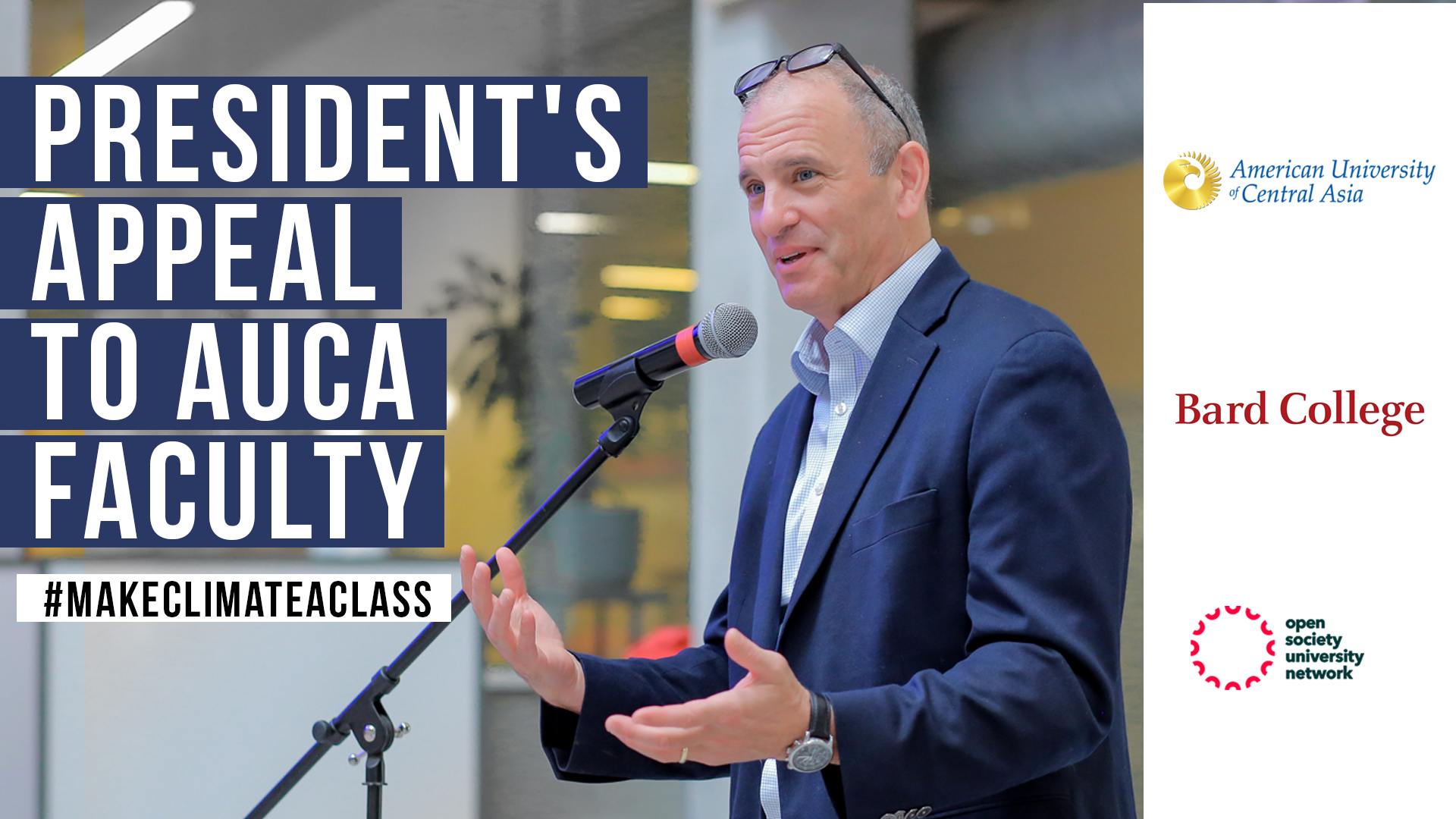January 16, 2023

��
Dear Colleagues,��
��
As you prepare your syllabi for the spring, I am writing to urge you to participate in the #MakeClimateAClass project that Eban Goodstein, Director of the Center for Environmental Policy at Bard; Director and faculty of the Bard MBA in Sustainability, initiated in November 2022. The idea is to use our collective power as educators to focus ALL AUCA students - and OSUN campuses across the network - on ways they can engage with thinking about climate change within each of your particular disciplines, and in their lives beyond AUCA.
��
At Bard, we are working to get thousands of classes across the OSUN network and across all disciplines to be a part of this project, including AUCA. Faculty members who agree to #MakeClimateAClass can come from across the curriculum, including anthropology, business, economics, film, history, journalism, law, media, philosophy, politics, psychology, sociology, and many other disciplines taught at AUCA. The eight OSUN campuses that participate in the Network Collaborative Class on Civic Engagement will all��#MakeClimateAClass.
Please join us:����with your intent to participate.
��
Information sessions and workshops will be offered to advise on strategies.
��
Eban’s letter to the faculty of Bard College outlining the effort in more detail is listed below for your information.��
��
Thanks for your consideration.
Best, Jonathan President.
��
��
��
Dear Faculty,
This year, the Bard Climate Teach-In is back, with a twist. As you prepare your 2023 syllabi, rather than participate in an all-campus event, we are asking you to��#MakeClimateAClass��for 30 minutes in ALL your classrooms in March or April, from your disciplinary perspective. See the simple ask below. So we can track participation,��with your intent to participate!
Why take the Teach-in to the classroom? Last year, we reached 200 students. With this new model, we can reach 2,000 or more. The idea is for all of us to inspire our students to engage with climate issues by thinking about climate change as psychologists, artists, faith leaders, lawyers, communicators, and social and natural scientists.
��
This March,��we are��asking��that all Climate-Concerned Faculty spend��30 minutes��in their classrooms talking about how their fields-- economics, philosophy, music, history, chemistry, and computer science -- are engaging with climate solutions and climate justice. Here is the suggested format:��
15 Minutes:�� A discussion on how��your field��is contributing to climate justice/climate solutions.
15 Minutes:�� Zoom in an alum��or colleague who is working professionally on climate in your field. The Bard Graduate Programs in Sustainability (GPS) have����with whom we can connect you, with varied backgrounds from the arts, humanities, and social and natural sciences. So we are glad to help you find a guest speaker who can speak to working on climate in your field.
If twenty Bard Faculty members do this in all their classes, we'll be talking with 1000 to 2500 students. If forty, 2,000 to 5,000 (with students gaining multiple perspectives from teachers). And so on up. This level of campus-wide engagement can inspire our students to move beyond climate despair to a sense of intellectual excitement and of agency around climate change solutions.��
��
Help us track participation by��in one or more of your classes (ideally all of them!) sometime in March or April.��
Please also sign up if you will be talking about the climate��for 30 minutes or more anyway, and are not using this format, again so we can track engagement. You can sign up for one of our��BARD��ALUM GUEST SPEAKERS tailored to your discipline there as well.
#MakeClimateAClass��is organized by��, an initiative run through Bard GPS and the Open Society University Network. Thousands of other Climate Concerned faculty members will be taking part in this campaign in March and April 2023.��
��
I know that you have a lot of material to cover in your spring classes. However, with climate change, we are at a truly extraordinary moment for humanity. As an educator, helping students understand how they can engage with climate justice and climate solutions from the perspective of your field is vitally important. As you are planning your spring syllabi, please find half an hour in each of your courses to��#MakeClimateAClass.��
Thank you for considering this request.����Look for more information on the��#MakeClimateAClass project through the spring semester. And of course, glad to answer any questions.
Eban
��